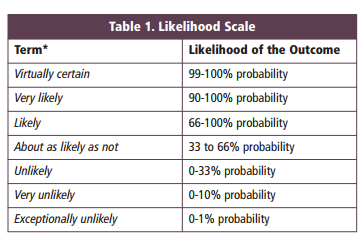When asked what he thought his odds were on winning a big lottery, one ticket buyer said, “Oh, fifty-fifty. I either win or I don’t.” Unfortunately for him, this poor guy is without a clue the actual odds were millions to one against him.
Unfortunately, this Mother Jones article argues that typical Americans are “unlikely” to be much more sophisticated than this lottery ticket buyer. In fact, it’s “very likely” they do not know the specifics of how scientists working on IPCC reports use these terms:
“Study: It Is “Very Likely” That Scientists Are Confusing Us about Global Warming”
Here’s a handy chart of what they mean when they use certain words:
So, after reading that, where do you fall on the scale of numeracy and comfort with statistics? Here’s a bit from the Mother Jones article. Read it and answer one question:
According to Budescu’s research, while the IPCC intends for “very likely” to mean a greater than 90 percent likelihood, that’s not necessarily the message the average person hears. Instead, when Budesco and his colleagues asked members of the public to assign a probability to the term “very likely,” the mean estimate people gave was just 62 percent.
OK, here’s the question. What does “mean” mean in the next to last line of this quotation?
If you don’t know, it’s “very likely” you ain’t that all that good with basic statistics and also “likely” you ain’t good with math at all.
Yeah, I know. It’s “virtually certain” I’m pedantic.
Cassandra

Leave a comment